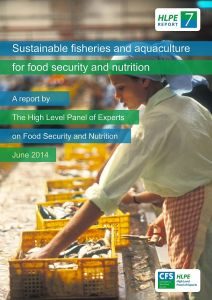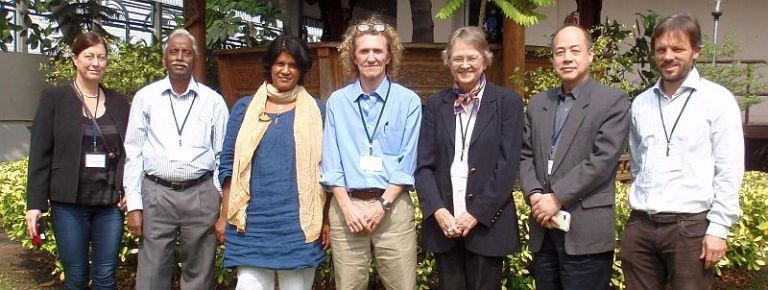
A new report, Sustainable Fisheries and Aquaculture for Food Security and Nutrition, has provided probably “the most comprehensive recent attempt to review and synthesize the current knowledge” said Dr Christophe Béné. Dr Béné, of the Institute of Development Studies, chaired the team of the High Level Panel of Experts (HLPE) on Food Security and Nutrition of the Committee on World Food Security that produced the report.
The report recommends that fish need to be fully integrated into all aspects of food security and nutrition policies and programmes. It pays special attention to all dimensions of food security and nutrition and promotes small-scale production and local arrangements, as local markets, e.g. for procuring school meals, and other policy tools, including nutrition education and gender equality.
The report is dedicated to Chandrika Sharma who was one of the peer reviewers of the report.

HLPE Team for fish, food security and nutrition report. Left to right: Gro-Ingunn Hemre, Modadugu V. Gupta, Moenieba Isaacs, Chris Béné, Meryl Williams, Ningsheng Yang and Vincent Gitz (Secretary)
Download the report here
Extract of the FOREWORD by Per Pinstrup-Andersen, Chair of HLPE Steering Committee
This report addresses a frequently overlooked but extremely important part of world food and nutrition security: the role and importance of fish in seeking food and nutrition security for all. Fisheries and aquaculture have often been arbitrarily separated from other parts of the food and agricultural systems in food security studies, debates and policy-making. I applaud the Committee on World Food Security for its decision to bring fisheries and aquaculture fully into the debate about food and nutrition security.
The report presents a synthesis of existing evidence regarding the complex pathways between fisheries and aquaculture and food and nutrition security, including the environmental, economic and social dimensions, as well as issues related to governance. It provides insights on what needs to be done to achieve sustainable fisheries and aquaculture in order to strengthen their positive impact on food and nutrition security.
The ambition of this compact yet comprehensive report is to help the international community to share and understand the wide spectrum of issues that make fisheries and aquaculture such an important part of efforts to assure food security for all.
…
The High Level Panel of Experts on Food Security and Nutrition (HLPE) was created in 2010 to provide the United Nations’ Committee on World Food Security (CFS) with evidence-based and policy-oriented analysis to underpin policy debates and policy formulation. While specific policy interventions should be based on context-specific understanding, HLPE reports provide evidence relevant to the diversity of contexts, with recommendations aiming to be useful to guide context-specific policy interventions.
…
The main findings of the report cover the themes:
- Fish as a critical food source
- Fish has received little attention in food security and nutrition strategies
- Risks and pressures affecting the world fisheries
- Opportunities and challenges in aquaculture
- Small vs large scale fishing operations
- Unsettled debates on fish trade
- Social protection and labour rights
- Gender equity
- Governance
In the Executive Summary, the report says the following on Gender Equity (paras 27-29; the body of the report contains more detail)
- 27. The first comprehensive attempt to estimate the number of fish workers found that 56 million, near half of the 120 million people who work in the capture fisheries sector and its supply chains, are women. This is essentially due to the very high number of female workers engaged in fish processing (including in processing factories) and in (informal) small-scale fish trading operations. However, small-scale fisheries and supply-chain jobs outside production are not well recorded, so the actual number of women may be higher. Comparable estimates are not yet available for the 38 million aquaculture sector workers.
- 28. Gender, along with intersectional factors (such as economic class, ethnic group, age or religion), is a key determinant of the many different ways by which fisheries and aquaculture affect food security and nutrition outcomes, availability, access, stability and diet adequacy, for the population groups directly involved in fish production and supply chains, but also beyond.
- 29. Men are dominant in direct production work in fisheries and aquaculture. Much of women’s work, such as gleaning, diving, post-harvest processing and vending, is not recognized or not well recorded, despite its economic and other contributions. Gender disaggregated data are not routinely collected and, partly as a result of this, little policy attention is given to women and to the gender dimension of the sector.
In the Recommendations, item 7 addressed Gender Equity with the following recommendation (7)
States should
- 7a) Ensure that their aquaculture and fisheries policies and interventions do not create negative impacts on women and encourage gender equality.
- 7b) Enshrine gender equity in all fisheries rights systems, including licensing and access rights. The definitions of fishing must cover all forms of harvest including the forms typically practised by women and small-scale operators, such as inshore and inland harvesting of invertebrates by hand and the use of very small-scale gear.
This entry was posted in: Aquaculture, Freshwater Fisheries, Gender, Marine Fisheries, Men, Women
